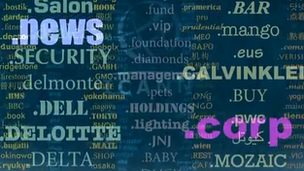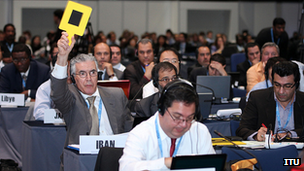Icann to set new internet address timetable with raffle
- Published

Icann aims to roll out the first new suffixes before the end of May 2013
Internet name regulator Icann is to decide which order it will handle applications for new suffixes later.
The organisation has opted for a low-tech solution - a raffle - after proposals to hold a "digital archery" contest proved controversial.
Under the original scheme applicants would have had to have clicked on a button as close to a given time as possible to secure an early evaluation.
A total of 1,930 requests, external have been made for new generic top-level domains.
They include .ninja, .buy and .vip as well as Japanese, Arabic and other non-Latin script suffixes, as alternatives to existing generic top-level domains (gTLDs) such as .com or .org.
However, an early evaluation is no guarantee that a submission will be successful.
Governments have already lodged more than 250 "early objections", external to proposals including .islam, .weather and .army for a variety of reasons.
Several companies are also competing for identical suffixes with .app, .book and .music proving to be some of those most in demand,
'Fairest system'
With hundreds of new gTLDs set to be approved Icann says that it opted for a staggered release to ensure the move did not undermine "the stability and security of the internet".
However, this creates a problem - the initial successful applicants will have a head-start at promoting their suffixes, potentially making it easier for them to attract third parties to register sites with their net endings.
Icann had originally planned to use the digital archery scheme to split the applications into three batches.
However, it abandoned the idea in June after applicants suggested network issues would give some businesses an unfair advantage over others.
Icann toyed with trying to handle all the applications at once before deciding to hold a "priorisation draw", external. Each applicant has had to buy a $100 (£62) ticket for each submission they made to have a chance of avoiding them being in the last group to be vetted.
"It's the fairest system we could come up with," spokesman Brad White told the BBC.

Icann's regulation of the net address system proved a point of contention at the UN's treaty talks
"It's not ideal, or perfection - but there was no better alternative."
The event will take place at the Hilton Hotel at Los Angeles airport starting at 13:00 local time (21:00 GMT) and is expected to last about six hours.
Results will be posted to Icann's site at some point over the following day, external.
Legitimacy debate
The raffle returns Icann to the spotlight just days after a heated debate at a UN conference in Dubai.
Russia, China and others had pressed for an international telecommunications treaty to say 193 countries should be given equal rights to manage "internet numbering, naming, addressing and identification resources".
That was seen as an attack on the current system in which the US government decides which organisation should be in charge of the net's address system. It recently renewed Icann's contract despite criticism of the group's move to roll out so many new net addresses at once.
Although Russia and China were ultimately convinced to drop their proposal the final treaty still contained a non-binding suggestion that "all governments should have an equal role and responsibility for international internet governance."
The US, UK and dozens of other countries refused to ratify the final document.
With this in mind one expert said it was critical that Icann delivered a smooth rollout of the new gTLDs to avoid giving its critics another opportunity to try to wrest its powers away.
"One of the big questions at the UN conference was the legitimacy of how the internet is regulated," said Dr Victoria Nash from the University of Oxford's Internet Institute.
"These new top-level domains have been very controversial and Icann is already vulnerable in terms of how it's run the process.
"In light of last week's events it has to prove it can do this effectively, fairly and legitimately if it's to avoid further challenges that its work would be better done through the ITU [International Telecommunication Union]."
Icann intends for the first batch of new suffixes to go live by the end of May.
Their owners will face a $25,000 annual renewal fee for each suffix in addition to the one-off $185,100 evaluation and raffle fees they have already paid.
- Published14 December 2012
- Published21 November 2012
- Published13 June 2012